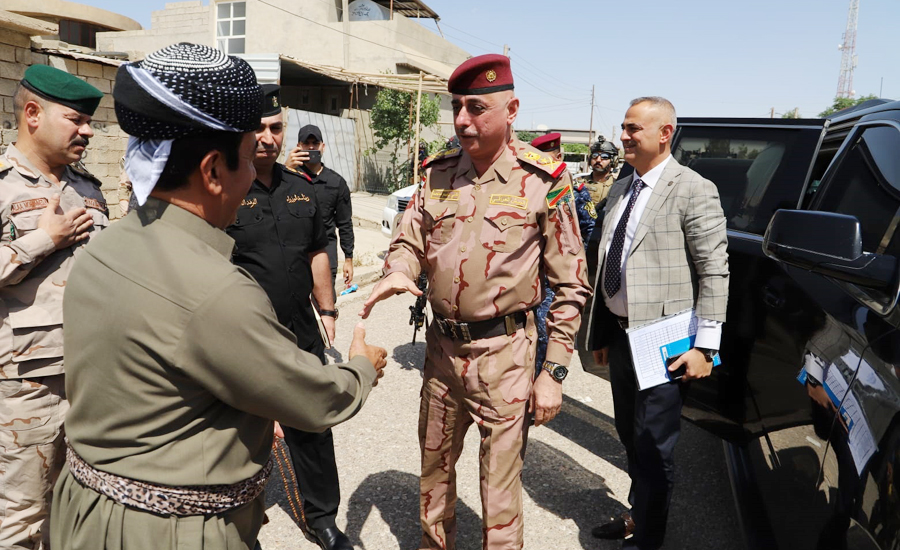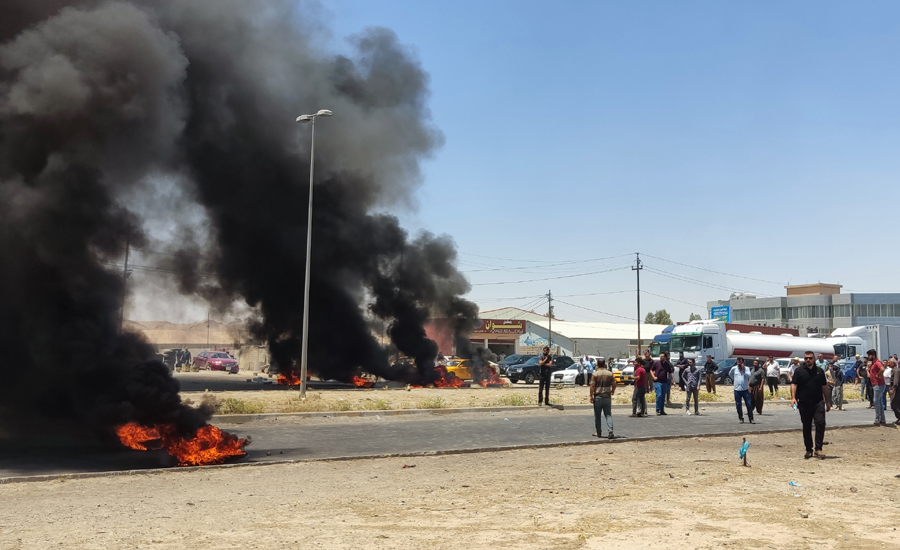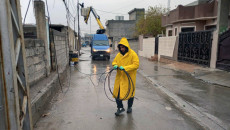The Kirkuk administration has decided to increase 20 megawatts of electricity to the villagers of the two subdistricts of Shiwan and Altun Kupri, as a condition to end the demonstrations.
The decision was taken by the acting governor of Kirkuk who was scheduled to receive the representatives of the villagers inside the governor's office ahead of demonstrations.
On Wednesday, June 1, a number of residents of villages belonging to the two subdistricts of Shiwan and Altun Kupri in Kirkuk, organized a large demonstration, and blocked Kirkuk-Erbil highway for hours against the continuous power outages in their areas as temperature is soaring up in the region.
The villagers were planning to postpone the demonstration till they meet the governor, but the failure of Rakan Saeed to receive the representatives of the demonstrators on Wednesday morning pushed the furious demonstrators to take the streets and blocked the main road between Kirkuk and Erbil.
"We went to the Kirkuk governor's office as representatives of several villages in the area because we had an appointment with Rakan Saeed, but he had left office. They said he had gone to open the agricultural warehouse," said Mohammed Hassari, council of Hasar village.
There are days when they give us only one hour of electricity out of seven hours
After two hours, the governor could not be seen, so the demonstration began on the main road between Erbil and Kirkuk. Demonstrators burnt tires on the road and completely disrupted traffic. The road connects Erbil and most of the cities in the region to Kirkuk and other central provinces of Iraq.
Electricity has been cut off in these villages for at least 10 days.
"There are days when they give us only one hour of electricity out of seven hours, and it cuts off more than five times during that hour," said Aram Mahmoud, one of the demonstrators.
Video: demonstration by villagers Shiwan and Altun Kupri subdistricts at northern entrance of Kirkuk.
“When we closed the main road for several hours, the Kirkuk administration itself requested a meeting,” Mahmoud said.
As the demonstration took place and widely covered by the media, the acting governor of Kirkuk, asked the demonstrators' representatives to meet.
The acting governor was visiting the Patriotic Union of Kurdistan PUK to congratulate the party on its anniversary. There he met with the representatives of the villages and promised to provide extra 20 megawatts of electricity to the villages.
"He also promised to provide services to the villages of the two districts," Hasari added.
KirkukNow contacted the Kirkuk governor's office several times, but they have not responded.
When we closed the main road for several hours, Kirkuk administration itself requested a meeting
Kirkuk province needs more than 1,000 megawatts of electricity daily to provide electricity to the locals, but receives less than half and relies on 733 private generators to fill the gap.
Following gulf war in 1991, the Iraqi state infrastructure was sharply hit by the economic embargo on Saddam Hussein regime due to damage of many transmission lines and substations leaving the basic services provided by the state inadequate.
Beside the national network of state-subsidized electricity supply all over Iraq, residential units and business projects rely on private generators for power supply to fill the gap of national power outage.

According to a source preferred to stay anonymous, Rakan Saeed, at 2 am on Tuesday, May 31, promised the mayor of Altun Kupri to meet with the representatives of the villages on the morning of June 1 and receive their demands, provided they do not demonstrate. However, the meeting was delayed and demonstrations began.
"I think there was no purpose behind the delay, because the same morning there was a demonstration in front of the provincial building by a number of trainees of North Oil Company, they had closed the building," the source said.
Kirkuk has exported 3.2 million barrels of crude oil last May, earning more than $369 million American dollars.
Located 238 kilometers north of Baghdad, Kirkuk is an ethnically mixed province for 1,7 million Kurds, Sunni and Shiite Arabs, and Turkmens. It has long been at the center of disputes between Baghdad and the Erbil.
Though the five oil wells of Kirkuk pump hundred thousand barrels of crude oil a day, the province misses proper utilities of power supply, drinking water, garbage collection, and basic healthcare and education system badly hurt by corruption and long years of war and instability.
"Our anger is not new. We have been angry for a month because there were days when they gave us only one hour of electricity (in 24 hours)," said Karim Ali, the head of Dubzni village in Shiwan district.
"The security forces pushed me and shot in the air in front of journalists and media," Ali added.
Some of the demonstrators did not even allow vehicles carrying patients. Kirkuk Now's reporter saw several protesters climbing on the roof of a car, causing damage to it because he was asking to be allowed to take a patient into the city.
Abdulmuttalib Najmadin, the mayor of Altun Kupri district, said the governor spoke to the director of electricity distribution on the phone and decided to add 20 megawatts of electricity to these villages.
“Rakan Saeed told them to take their demands to the mayor in order to address it.”
A day after the demonstration, General Ali Al-Fireji, the commander of the joint operations in Kirkuk, visited the villages and met with representatives of the demonstrators.
He apologized to Najmaddin, affirming that the physical abuse is not attitude of the security forces in dealing with the demonstrators.
Iraq's electricity ministry has cited a number of causes for the prolonged and widespread cuts including sabotage attacks, shortages of fuel for power stations, and the suspension of energy supplies from neighboring Iran.
Sabotage acts have lately found power transmission towers a hot target.
The Iraqi ministry of electricity said in a statement last August that 13 towers for transmission of power were damaged by the militants in 48 hours in Ninawa, Kirkuk and Salahaddin, including Kirkuk-Gayarra (in Mosul) by IED, causing damage to five towers.






